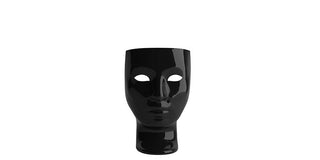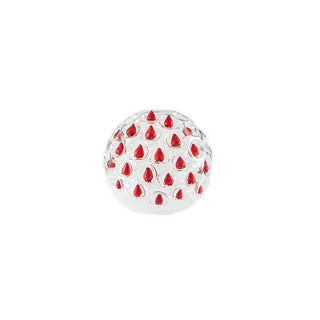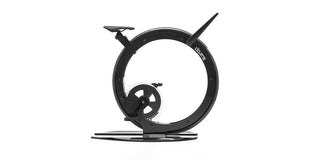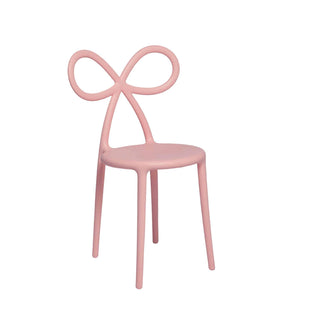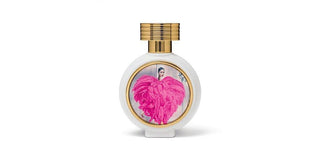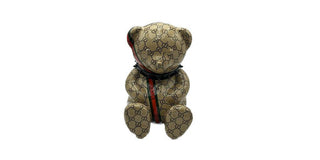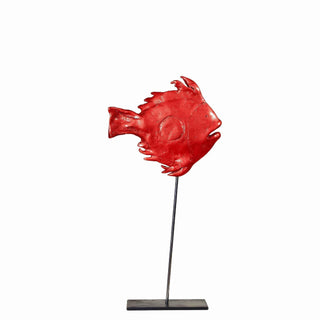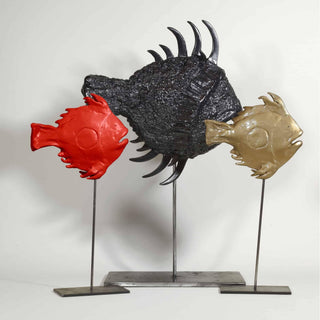This stunning creation belongs to Fabio Pietrantonio's limited-edition San Pietro Fish Collection and features a delightful John Dory fish completely crafted of resin with an elegant gold-graphite finish, sleek iron stem, and rectangular base support. This sacred art-inspired oeuvre is intended to bestow good fortune and positive thoughts and will create an astonishing effect in a classic or modern space with its eccentric quality and exquisite sculptural details.
Dimensions: 43 x 21 x 20 cm
Material: Resin Iron
Fabio Pietrantonio
Fabio Pierantonio has art in his blood, it runs through his veins. Fabio Pietrantonio's art wants to tell the vital balance between man and nature. Thanks to his long travels he learned about the spirituality of the Australian and Native American aborigines, who told him how contact with nature helps him to exorcise the anxieties of the frenzy of modern life. Fabio Pietrantonio expresses himself through carefully selected organic materials that he combines to convey a harmony of shapes, colors, and emotions. Fabio Pietrantonio lives between the Alps and Sardinia, feeding on their uncontaminated nature.
In Fabio Pietrantonio's artistic production the iconography of the San Pietro fish occupies a place of primary importance. Since the time of his apprenticeship with his first teacher Gaspare da Brescia, the artist has experimented with this subject by sculpting it for him on the occasion of important commissions. The morphological characteristics of the fish represent an interesting challenge for those who are preparing to portray it: the ellipsoidal shape of the body, giant flattened on the sides, is embellished with scales and asperities both in the dorsal part, with long and thorny fins, and in the central one. It is therefore from the observation of this unique fish that the necessary path of individual liberation begins for Fabio Pietrantonio, which characterizes the search for an artist committed to outlining his own identity of contents in the bed of a precise stylistic elaboration. In this sense, in the first production of the artist (we are in the mid-90s), the San Pietro becomes a sort of generative icon on which all his creative imagination will then be built.
The mystical amazement that springs from an authentic and devoted relationship with nature animates all of Fabio Pietrantonio's poetics. It is a profound bond that has recently consolidated into shamanic conduct that manifests itself both in everyday life and on the occasion of the presentation of public installations and performances. A form of awareness achieved gradually began to take shape precisely in the relationship with the San Pietro, this grotesque marine creature that has always been enveloped by an aura of sacredness. Legend has it that the strange black spot in the center of the body was imprinted by St. Peter who, at the invitation of Christ, grabbed the fish with his hand and extracted gold coins from its mouth. Since then, the saint's fingerprints have characterized the luminous livery of this mysterious fish, whose bizarre and brutal appearance, combined with a shy and solitary nature, reinforce its ascetic image. It is, therefore, no coincidence that St. Peter's can appear to the eyes of an artist as a real “living sculpture”, a being that resides on an illusory border that places divine and artistic creation on the same level. Fabio Pietrantonio has repeatedly returned to this subject in sometimes obsessive terms, creating works on canvas and wood, collages, bas-reliefs, fusions, drawings, and various printing techniques. A personal religious symbolism has therefore been reconstructed around this representation which tends to recover the authentic and original Christian values. In a spectacular declination of the subject of Saint Peter, the artist reworks its shape using hundreds of nails fixed and folded on a wooden board. The Christological references used are clear; the instruments of passion are combined in the manner of Arcimboldo, and from objects of martyrdom they become regenerative cells that give shape to a new life, a new mystery, and a new and shining symbol.
After about twenty years, returning to this subject again means confirming the consistency of one's path, having the courage to reaffirm the paradigmatic and symbolic value of this iconographic choice in one's personal adventure and reflection.
This stunning creation belongs to Fabio Pietrantonio's limited-edition San Pietro Fish Collection and features a delightful John Dory fish completely crafted of resin with an elegant gold-graphite finish, sleek iron stem, and rectangular base support. This sacred art-inspired oeuvre is intended to bestow good fortune and positive thoughts and will create an astonishing effect in a classic or modern space with its eccentric quality and exquisite sculptural details.
Dimensions: 43 x 21 x 20 cm
Material: Resin Iron
Fabio Pietrantonio
Fabio Pierantonio has art in his blood, it runs through his veins. Fabio Pietrantonio's art wants to tell the vital balance between man and nature. Thanks to his long travels he learned about the spirituality of the Australian and Native American aborigines, who told him how contact with nature helps him to exorcise the anxieties of the frenzy of modern life. Fabio Pietrantonio expresses himself through carefully selected organic materials that he combines to convey a harmony of shapes, colors, and emotions. Fabio Pietrantonio lives between the Alps and Sardinia, feeding on their uncontaminated nature.
In Fabio Pietrantonio's artistic production the iconography of the San Pietro fish occupies a place of primary importance. Since the time of his apprenticeship with his first teacher Gaspare da Brescia, the artist has experimented with this subject by sculpting it for him on the occasion of important commissions. The morphological characteristics of the fish represent an interesting challenge for those who are preparing to portray it: the ellipsoidal shape of the body, giant flattened on the sides, is embellished with scales and asperities both in the dorsal part, with long and thorny fins, and in the central one. It is therefore from the observation of this unique fish that the necessary path of individual liberation begins for Fabio Pietrantonio, which characterizes the search for an artist committed to outlining his own identity of contents in the bed of a precise stylistic elaboration. In this sense, in the first production of the artist (we are in the mid-90s), the San Pietro becomes a sort of generative icon on which all his creative imagination will then be built.
The mystical amazement that springs from an authentic and devoted relationship with nature animates all of Fabio Pietrantonio's poetics. It is a profound bond that has recently consolidated into shamanic conduct that manifests itself both in everyday life and on the occasion of the presentation of public installations and performances. A form of awareness achieved gradually began to take shape precisely in the relationship with the San Pietro, this grotesque marine creature that has always been enveloped by an aura of sacredness. Legend has it that the strange black spot in the center of the body was imprinted by St. Peter who, at the invitation of Christ, grabbed the fish with his hand and extracted gold coins from its mouth. Since then, the saint's fingerprints have characterized the luminous livery of this mysterious fish, whose bizarre and brutal appearance, combined with a shy and solitary nature, reinforce its ascetic image. It is, therefore, no coincidence that St. Peter's can appear to the eyes of an artist as a real “living sculpture”, a being that resides on an illusory border that places divine and artistic creation on the same level. Fabio Pietrantonio has repeatedly returned to this subject in sometimes obsessive terms, creating works on canvas and wood, collages, bas-reliefs, fusions, drawings, and various printing techniques. A personal religious symbolism has therefore been reconstructed around this representation which tends to recover the authentic and original Christian values. In a spectacular declination of the subject of Saint Peter, the artist reworks its shape using hundreds of nails fixed and folded on a wooden board. The Christological references used are clear; the instruments of passion are combined in the manner of Arcimboldo, and from objects of martyrdom they become regenerative cells that give shape to a new life, a new mystery, and a new and shining symbol.
After about twenty years, returning to this subject again means confirming the consistency of one's path, having the courage to reaffirm the paradigmatic and symbolic value of this iconographic choice in one's personal adventure and reflection.




